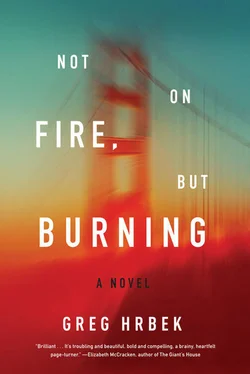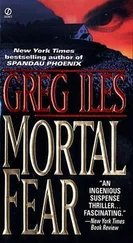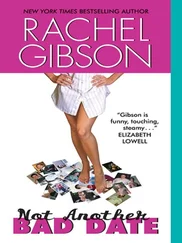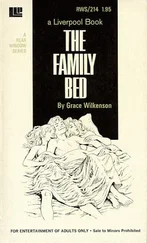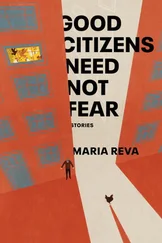“Oh, Professor Wakefield!”
“It’s okay.”
Of the three books in her hand, library books the size of stone tablets, one has fallen to the floor. Mitch moves to pick up the book, then takes the others from her and sets them down on the faux-wood countertop. He recognizes her. A student assistant. The reason he didn’t hear her coming: bare feet (toenails painted black).
“I just came to do some copying,” she says.
“All yours.”
He bends over the computer and closes the file. Logs off. There are eight printouts of the photo spread over the desk.
“You’re a photographer, too?”
“Me? No.”
“Looks like a photo. Or is it a painting?”
(Glancing at her while completing the shut down.) “What’s your name again?”
“Chloe Bennett.”
He nods, then holds out one of the printouts: “Chloe, what does this look like to you?”
“Hmm … Man Ray?”
“What? No,” Mitch says. “I mean, does it look like something. Can you tell what it is?”
After quite a long time, she says: “A quasar.”
“A quasar.”
“I took Astronomy last semester.”
“Can you see a girl? See. This is the head, the body …”
She squints and tilts the paper. Finally says: “Oh. Oh, yeah.”
“Do you?”
“No, I do. It’s like she’s floating in a fog. That’s very trippy, Professor.”
“Yeah, it is.”
“Is it your daughter?”
He looks at her. First in the eyes. Then, when she looks away, not of his own free will, at her chest. Then away, at her hands holding the photo; and sees on one wrist, a pale pink scar. Says: “No. No, it’s not. I don’t have a daughter.”
The party’s over. Guests gone home. The girl, Khaleela, had been the last. Will had sat with her on the front steps in silence, in the hot shade with glasses of iced tea, water condensing on the glasses and gathering into beads that tracked down the outsides and clung to the round bases, then let go, falling to the concrete step. When her father came, Will explained to him (as he had to each parent in turn) what had happened. That he had been wrong. Had rushed the boy into something he wasn’t ready for. “It’s my fault. I should’ve known better.” And this parent — a tall man, arms crossed at a strong chest — did not regard Will Banfelder (as the others had) with accusatory agreement, but said in a voice whose low pitch seemed augmented by a subwoofer in the throat:
“Don’t be so hard on yourself, it was just a fistfight.”
As the car backed away, the girl waved from the rear window, a gesture of regret and sympathy beyond her years.
Now here he stands. All around him, the goddamn bugs. Whose chorusing is like a kind of laughter. Inside the house, the boy, his son (think son , keep using the word) is waiting. To be questioned, lectured, punished. Just a fistfight. Will wonders if maybe the man is right. Don’t be too hard on yourself. Or him. No one’s dead, after all. Just a bloody nose . But it somehow seems unlikely that the Wakefields are going to be interested in anyone else’s idea of what constitutes actual violence. Don’t fool yourself. A harm has been done here, a harm. This behavior cannot be in any way sanctioned. And yet it’s your fault, not his. You rushed him. You should’ve known .
So goes the thinking of Will Banfelder — not in circles so much as by random turns, as if his mind is blindly navigating a maze — as he returns to the house, opens the glass door to the kitchen and confronts not only the remains of lunch (the dirty plates and utensils, the leftover meat and hummus, a housefly crawling on the waste), but also the specter of dessert: the seven bowls he had set out on the counter. The old man stands there, trying to decide what to do first. Finally goes to the freezer. Scoops ice cream, pours on some fudge sauce, and tops it off with Kool Wip. At the table, with a plastic spoon, he eats it all. Then climbs the stairs, approaches his son’s door, and knocks.
Clifford Wakefield has never been close with his younger brother. He can still remember when his parents announced the news of a coming baby. (He was six years old and just starting first grade.) First a shock of undoing, as if the fabric of space was tearing along a seam; and then, for months afterward, a sense that the established circumstances of life were not so much changing as being confused with a set of circumstances that were alien and invasive. It wasn’t that he couldn’t imagine a brother or sister. His mind was not denying the possibility of a mother having a baby. But this mother. This mother who was his mother. He tried to understand the situation in terms of something his grandfather had used as a soldier in Vietnam, a keepsake he had allowed Cliff to play with at his house in the Oregon Territory — a circular object with a glass cover and a silver needle under the glass, a magnetized needle that, in obedience to physical laws, only ever pointed in one direction: true north. Now, if the needle were to point east and only east. Well, that was impossible. But what if it did … They were right, of course, his parents, when they told him he’d get used to the baby. But the next summer when they visited that house on the lake, Cliff, now seven, saw the compass laid out in the same place as always, on a shelf beside an old aneroid barometer (the hand of which seemed never to be pointing left or right, not to the forecast of RAINor FAIRscripted on the face, but always straight up, to the word CHANGE) — and he picked up the compass and, turning his body in different directions, watched the needle being realigned by the powers of the planet, thinking that, just as the needle of this compass cannot point east, there cannot be a baby, cannot be a brother.
He has been thinking about all of this lately, thinking of it in the light of what his schizo brother has been saying about a sister, and sensing a creepy parallel — and just last night, he had a dream that really scared him, which both answered the question of Dorian’s strange behavior in recent months and explained the equally strange conviction from his own sixth and seventh years, as follows:
He was walking in a forest and encountered a man sitting under a tree clothed in a T-shirt and ripped blue jeans (feet bare). The man had long hair and a bandanna wrapped around his head. Also, the man was smoking an old-fashioned blunt. He didn’t look especially intellectual. But not only was he wicked smart, he was telepathic, because before Cliff had said a single word, the man said something along the lines of: Let ∞ be a set of universes, U’s, of distinct but parallel paths (A 1— Z 100), each of which is a set of events, E’s, on ordered pairs (), such that any variation in any E will have already resulted in the formation of a new U. With these presuppositions before us, we can now turn to your situation. My situation? The one you came here to discuss. Euforia? No, thanks . Consider the path you are on (B 39— R 61): You have a brother. On other paths (such as K 8— E 76), you don’t. One path is central: M 50— M 50. If a significant event from that path is sensed on any other path, RS may begin to break down. RS? Reality-structure. Awareness of central path events may lead to new orderings of that undermine RS. How? Your current situation is a textbook example. Your brother has become aware of an event that occurred on M 50— M 50. He is taking actions influenced by that event. So, we really do have a sister . Did. She died . Correct. Your brother has become aware of that. His actions in B 39— R 60are being influenced by that awareness and are creating consequents. You mean consequences . No, I mean consequents. A consequent is the second term of a mathematical ratio. The first term is called an antecedent. When consequents in one universe have antecedents in a different one … What. What then. What happens then?
Читать дальше
